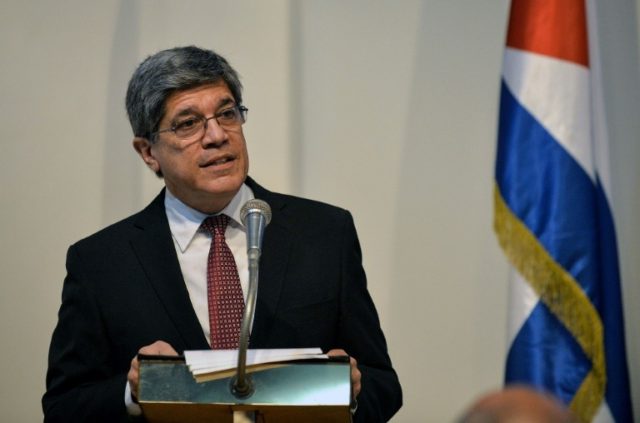Havana (AFP) – The re-election of Donald Trump as president of the United States would be “the worst” scenario for Cuba, Havana’s top diplomat in charge of relations with Washington told AFP.
“If the Republicans win … it’s a very negative scenario,” said Carlos Fernandez de Cossio, the foreign ministry’s general director for the US.
“It would mean at least a continuation of the policy of aggression against our country.”
Cuba has been subjected to a US embargo since 1962 — but, under Democratic President Barack Obama, tensions were easing.
Then Trump took power and began ramping up sanctions once more, cancelling or suspending many of the agreements made during Obama’s term.
In 2019 Trump added more than 80 sanctions, including those that hinder the supply of Venezuelan oil, discourage investments, give the green light for compensation claims in US courts against nationalized properties, and block commercial and financial activity.
Added to that, the general lockdown that has been provoked by the coronavirus pandemic has worsened the social situation for millions of Cubans in a country that was already suffering from food and fuel shortages.
Trump addressed a message on Wednesday to the Cuban community in Florida — a key swing state in November’s US election — in which he blasted “Cuba’s tyrannical regime.”
Many Cuban exiles and immigrants in Florida are passionately opposed to the communist regime in Havana, including Republican senator Marco Rubio.
Miami in particular is a hotbed of anti-Castro organizations that have been involved in sometimes violent activities against Cuba.
Fernandez de Cossio said a second Trump mandate would be even worse than the first because it would keep “people with an anti-Cuban trajectory” in “important positions inside the government, in the State Department structures or the National Security Council.”
No desire to end diplomacy
Despite that hostility, “Cuba has no interest in a breakup of relations with the United States,” said Fernandez de Cossio, although he insisted the island nation would be “ready” if that did happen.
Fernandez de Cossio claims that the Trump administration is “forcing officials, some of them with a long career, to lie openly, which is what is happening with State Department officials and even the embassy here in Havana.”
Even so, and despite criticism from the US Charge d’Affaires in Havana, Mara Tekach, Cuba has a history of tolerating hostile diplomats on its territory.
Fernandez de Cossio says “we don’t need to expel them.”
The hostility is evident in both countries.
On April 30, a Cuban immigrant fired 30 shots at the Cuban embassy in Washington.
Although he was detained immediately, Cuba says it has received no official communication from Washington on the case.
Havana has accused the US police of “complicity” in what it describes as an act of “terrorism.”
Fernandez de Cossio believes the US government doesn’t want to lift the lid on its own “links to this individual or with organizations or people with a history or with aggressive behavior towards Cuba.”
If that Pandora’s Box were opened, “the links to organizations with terrorist origins that exist in the United States within the law, in complicity, with protection from the United States government” would emerge.
“That’s the only way one can explain, other than the arrogance, … of this unyielding silence” from Washington, he added.

COMMENTS
Please let us know if you're having issues with commenting.